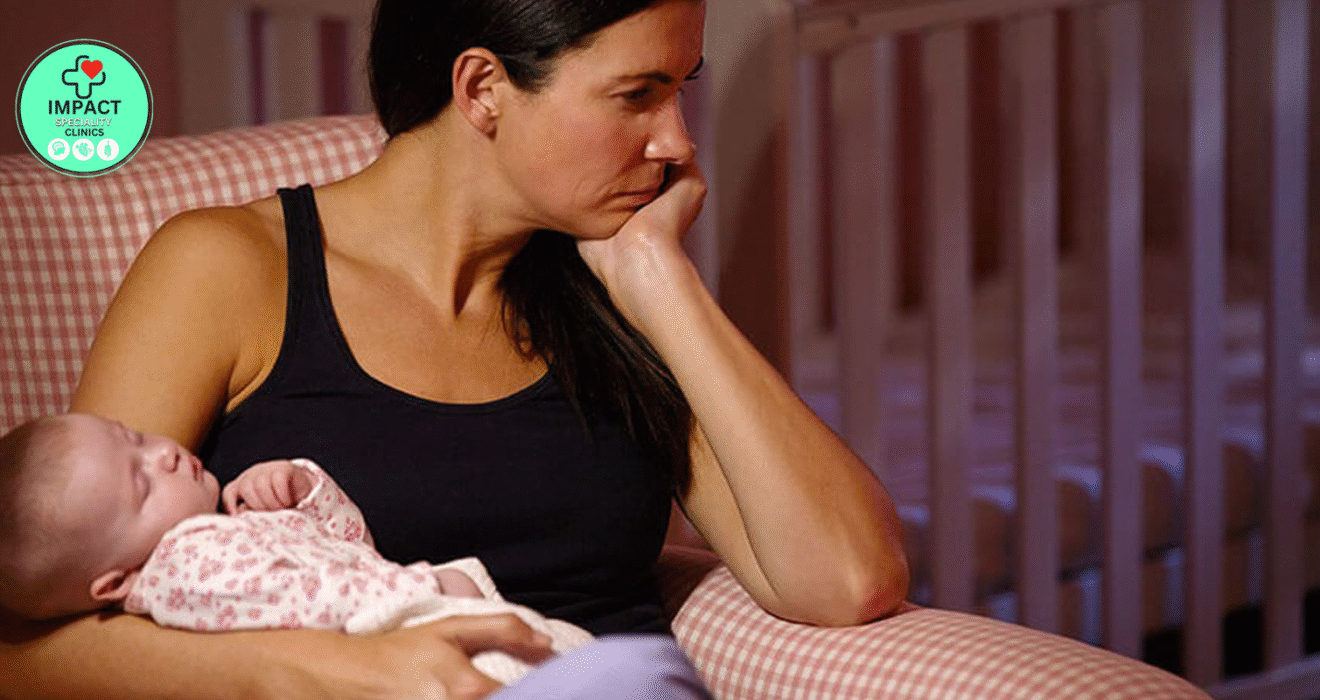Postpartum Depression: Symptoms, Support, and Recovery Tips
Bringing a new life into the world is one of the most profound experiences a woman can have. Yet, amidst the joy, excitement, and endless love that motherhood brings, many women quietly struggle with feelings of sadness, anxiety, or hopelessness. This emotional challenge is known as postpartum depression (PPD) — a condition that affects both the mind and body during the months following childbirth.
At Impact Specialty Clinics, comprehensive postpartum care is a cornerstone of women’s wellness. Under the compassionate expertise of Dr. Neha Shukla, a best Gynecologist in Narsingi, countless mothers have found comfort, understanding, and professional guidance in overcoming postpartum depression.
In this article, we’ll explore the causes, symptoms, and treatment of postpartum depression, along with practical recovery tips. With insights from Dr. Neha Shukla pregnancy care, new mothers and their families can learn how to identify symptoms early and take steps toward healing and emotional balance.
Understanding Postpartum Depression
Postpartum depression is more than just the “baby blues.” While it’s normal for new mothers to experience mood swings, irritability, or mild sadness in the first few weeks after delivery, postpartum depression lasts longer and feels more intense. It can begin days, weeks, or even months after childbirth.
According to Dr. Neha Shukla, an experienced best Gynecologist in Narsingi, postpartum depression affects approximately 1 in 7 mothers worldwide. The symptoms vary in severity, but the key is recognizing that it’s a medical condition — not a sign of weakness or failure.
Difference Between Baby Blues and Postpartum Depression
- Baby Blues: Typically occur within a few days after birth and last about two weeks. Symptoms include mild sadness, tearfulness, irritability, and fatigue.
- Postpartum Depression: Symptoms are more severe and persist for weeks or months. They can interfere with daily activities, relationships, and the ability to care for oneself or the baby.
The distinction is crucial, as postpartum depression requires medical support and emotional intervention — something that Dr. Neha Shukla pregnancy care at Impact Specialty Clinics is designed to provide with empathy and expertise.
Causes of Postpartum Depression
There is no single cause of postpartum depression. Instead, it results from a combination of physical, hormonal, and emotional factors. Dr. Neha Shukla, a leading Pregnancy specialist in Narsingi, explains the most common contributing elements:
1. Hormonal Changes
After childbirth, estrogen and progesterone levels drop sharply, leading to mood fluctuations. These hormonal changes can impact neurotransmitters in the brain, contributing to depression.
2. Sleep Deprivation
New mothers often face interrupted sleep due to frequent feeding and baby care. Sleep deprivation can worsen irritability, fatigue, and emotional distress.
3. Physical Discomfort
Postpartum pain, healing from a cesarean section, or complications like infections can contribute to low mood and frustration.
4. Emotional Adjustments
The transition to motherhood brings immense responsibility. Feelings of inadequacy or loss of independence can trigger emotional strain.
5. History of Depression
Women who have previously experienced depression or anxiety are at higher risk for postpartum depression. Dr. Neha Shukla pregnancy care always includes a detailed mental health evaluation to identify such risks early.
6. Lack of Support
Limited emotional, social, or financial support can amplify feelings of loneliness and helplessness — key triggers for postpartum depression.
Recognizing the Symptoms of Postpartum Depression
Postpartum depression can manifest differently in each woman, but common symptoms include:
- Persistent sadness or hopelessness
- Excessive crying without a clear reason
- Fatigue or low energy
- Difficulty bonding with the baby
- Withdrawal from family and friends
- Anxiety or panic attacks
- Loss of appetite or overeating
- Insomnia or excessive sleep
- Feelings of guilt or worthlessness
- Trouble concentrating or making decisions
- Thoughts of self-harm or harm to the baby (in severe cases)
If you experience several of these symptoms for more than two weeks, consult the best Gynecologist in Narsingi at Impact Specialty Clinics immediately. Early intervention can make a significant difference in recovery.
How Postpartum Depression Affects Mothers and Families
Postpartum depression doesn’t only affect the mother — it impacts her relationships, her baby, and her overall well-being. Babies of mothers with untreated PPD may experience feeding difficulties, sleep disturbances, and developmental challenges due to lack of bonding and emotional connection.
Dr. Neha Shukla, a respected Pregnancy specialist in Narsingi, emphasizes that postpartum depression should never be ignored or dismissed. With timely care and emotional support, full recovery is entirely possible.
Diagnosis of Postpartum Depression
At Impact Specialty Clinics, diagnosing postpartum depression involves a thorough evaluation, including:
- Detailed Medical and Emotional History: Reviewing symptoms, duration, and family history of depression or anxiety.
- Postpartum Depression Screening: Using standardized questionnaires such as the Edinburgh Postnatal Depression Scale (EPDS).
- Physical Examination: To rule out thyroid disorders, anemia, or other medical causes.
- Mental Health Referral: If necessary, Dr. Neha Shukla collaborates with mental health professionals for comprehensive care.
As the best Gynecologist in Narsingi, Dr. Neha Shukla ensures that mothers feel heard, respected, and supported during every step of diagnosis and treatment.
Treatment Options for Postpartum Depression
1. Counseling and Therapy
Cognitive-behavioral therapy (CBT) and interpersonal therapy (IPT) are highly effective in treating postpartum depression. These therapies help mothers process emotions, develop coping skills, and improve communication with loved ones.
2. Medication
If symptoms are severe, antidepressant medications may be recommended. Dr. Neha Shukla pregnancy care ensures that any prescribed medication is safe for breastfeeding mothers and closely monitored for side effects.
3. Hormone Therapy
In some cases, hormonal treatments help stabilize mood fluctuations caused by estrogen and progesterone imbalances.
4. Support Groups
Sharing experiences with other mothers facing similar challenges can be incredibly healing. Impact Specialty Clinics often encourages joining local or online postpartum support communities.
5. Lifestyle Changes
A balanced diet, regular exercise, mindfulness practices, and adequate rest can significantly improve emotional well-being.
6. Family Support
Family plays a vital role in recovery. Partners and relatives should offer practical help, emotional encouragement, and patience during this delicate period.
Self-Care and Recovery Tips for Postpartum Depression
Recovering from postpartum depression requires time, support, and consistent self-care. Here are expert-approved recommendations from Dr. Neha Shukla pregnancy care at Impact Specialty Clinics:
1. Prioritize Rest
Sleep when your baby sleeps. Even short naps can restore energy and balance emotions.
2. Eat Nutritiously
Include omega-3 fatty acids, fresh fruits, whole grains, and lean proteins to support brain health.
3. Stay Active
Gentle exercises such as walking or yoga can help release endorphins, which naturally improve mood.
4. Stay Connected
Reach out to friends or family members. Emotional connection is essential to overcoming feelings of isolation.
5. Set Realistic Expectations
You don’t have to be perfect. Focus on progress, not perfection, as you adjust to motherhood.
6. Communicate Openly
Talk to your partner about your emotions. Open communication helps them understand how to provide the right support.
7. Avoid Alcohol and Caffeine
These can interfere with sleep and worsen anxiety.
8. Seek Professional Help
If symptoms persist, never hesitate to consult Dr. Neha Shukla, the best Gynecologist in Narsingi, for immediate medical guidance.
How Impact Specialty Clinics Supports New Mothers
At Impact Specialty Clinics, postpartum care extends far beyond childbirth. Their comprehensive women’s wellness programs, led by Dr. Neha Shukla, include emotional, hormonal, and physical health assessments for every mother.
What makes Impact Specialty Clinics stand out is their integrated care model — combining gynecology, obstetrics, nutrition, and psychological counseling under one roof. Mothers receive ongoing follow-ups, ensuring complete recovery and a smooth transition into motherhood.
Whether it’s personalized therapy, medication management, or community support, Dr. Neha Shukla pregnancy care ensures no woman faces postpartum depression alone.
Breaking the Stigma Around Postpartum Depression
Despite growing awareness, postpartum depression remains stigmatized. Many women fear judgment or feel guilty about not feeling “happy enough.”
Dr. Neha Shukla, the best Gynecologist in Narsingi, advocates for open conversations about mental health during and after pregnancy. Educating families about postpartum mood disorders helps create a supportive environment for mothers to heal without shame.
Preventing Postpartum Depression
While not all cases can be prevented, several proactive steps reduce the risk:
- Attend regular prenatal and postnatal checkups at Impact Specialty Clinics.
- Stay physically active during pregnancy with your Pregnancy specialist in Narsingi’s guidance.
- Build a support network before delivery.
- Discuss your emotional history with Dr. Neha Shukla during prenatal visits.
- Maintain a healthy lifestyle with balanced nutrition and rest.
Early awareness and preventive strategies go a long way in ensuring emotional well-being for mothers.
When to Seek Immediate Medical Help
You should contact your healthcare provider or visit Impact Specialty Clinics right away if you experience:
- Thoughts of harming yourself or your baby
- Severe anxiety or panic attacks
- Inability to care for yourself or your child
- Feeling detached from reality (psychosis)
These are signs of severe postpartum depression or postpartum psychosis, which require urgent medical attention from the best Gynecologist in Narsingi, Dr. Neha Shukla.
Conclusion
Motherhood is a journey of love, strength, and transformation — but it also comes with challenges that deserve understanding and care. Postpartum depression is not a failure; it is a medical condition that requires compassion, professional help, and support.
At Impact Specialty Clinics, Dr. Neha Shukla, a leading Pregnancy specialist in Narsingi, has dedicated her career to empowering women through all stages of reproductive health. With her holistic Dr. Neha Shukla pregnancy care approach, mothers find hope, healing, and renewed strength to embrace motherhood confidently.
If you or someone you know is struggling after childbirth, reach out to Impact Specialty Clinics — where expert care and empathy go hand in hand.
SEO-Friendly FAQs
1. What are the early signs of postpartum depression?
Early signs include sadness, loss of interest, fatigue, anxiety, and difficulty bonding with the baby. Visit Impact Specialty Clinics to consult the best Gynecologist in Narsingi for timely help.
2. How long does postpartum depression last?
It varies from person to person. With proper support from Dr. Neha Shukla pregnancy care, most women recover within a few months.
3. Can postpartum depression affect my baby?
Yes, if untreated, it can impact bonding and the baby’s emotional development. Seeking help early from Dr. Neha Shukla, the Pregnancy specialist in Narsingi, is crucial.
4. Is medication safe for postpartum depression while breastfeeding?
Yes. The best Gynecologist in Narsingi at Impact Specialty Clinics ensures any prescribed medication is safe for both mother and child.
5. How can I prevent postpartum depression in the future?
Attend prenatal sessions, maintain self-care, and stay connected with Dr. Neha Shukla pregnancy care at Impact Specialty Clinics for ongoing support and monitoring.




